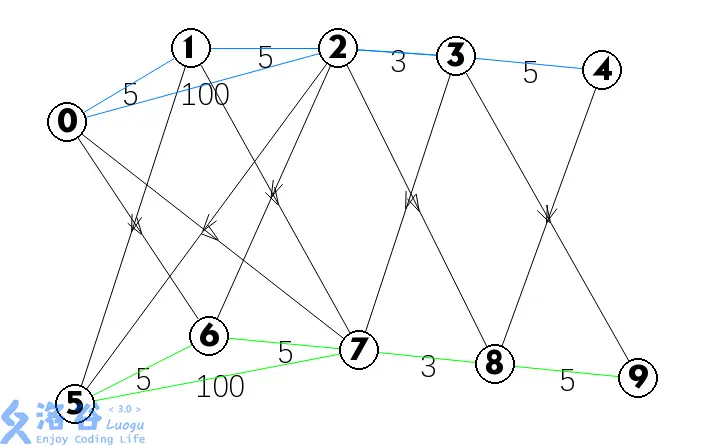P4568 [JLOI2011] 飞行路线
分层图的板子题
代码
#include <bits/stdc++.h> #define R(x) x=read() #define fi first #define se second using namespace std; typedef pair<int,int> PII; const int N = 1e4, M = 5e5; inline int read() { int x = 0, f = 1; char ch = getchar(); while(ch < '0' || ch > '9') { if(ch == '-') f = -1; ch = getchar(); } while(ch >= '0' && ch <= '9') { x=x*10+ch-'0'; ch=getchar(); } return x*f; } struct EdgeElement{ int toP, val, ne; }edges[M*11+5]; int h[N*11+5]; int n, m, k, s, t; int idx; inline void add(int a, int b, int c) { edges[++idx].toP = b; edges[idx].ne = h[a]; edges[idx].val = c; h[a] = idx; } inline void addDouble(int a, int b, int c) { add(a, b, c); add(b, a, c); } bool vis[N*11 + 5]; int dis[N*11 + 5]; int DJ() { priority_queue<PII, vector<PII>, greater<PII> > Q; memset(dis, 0x3f, sizeof(dis)); dis[s] = 0; Q.push(make_pair(0, s)); while(Q.size()) { PII t = Q.top(); Q.pop(); if(vis[t.se]) continue; for(int i = h[t.se]; i; i = edges[i].ne) { int j = edges[i].toP; if(dis[j] > dis[t.se] + edges[i].val) { dis[j] = dis[t.se] + edges[i].val; Q.push(make_pair(dis[j], j)); } } vis[t.se] = 1; } return dis[t + n*k]; } int main() { // spots: 0~n-1 R(n);R(m);R(k); R(s);R(t); for(int i = 1; i <= m; i++) { int a, b, c; R(a);R(b);R(c); addDouble(a, b, c); for(int j = 1; j <= k; j++) { addDouble(a + j * n, b + j * n, c); add(a + (j - 1) * n, b + j * n, 0); add(b + (j - 1) * n, a + j * n, 0); } } // attention! // additional operations about T for(int i = 1; i <= k; i++) add(t + (i-1)*n, t + i*n, 0); printf("%d\n", DJ()); return 0; }
细节
1.插入不同层之间的节点时,只能插入单向边,不能插双向边,以样例为例:

如果在不同层之间插入的是双向边,那就可以从起点走免费点到下一层,然后又走免费边回来……
最后零成本到达终点。
2.边数M的确定
起初我是这样算M的:
题目中给的m上限是5e4,先乘以二,然后又因为要加上十层图,再乘以11.
for(int i = 1; i <= m; i++) { int a, b, c; R(a);R(b);R(c); addDouble(a, b, c); for(int j = 1; j <= k; j++) { addDouble(a + j * n, b + j * n, c); add(a + (j - 1) * n, b + j * n, 0); add(b + (j - 1) * n, a + j * n, 0); } }
我们可以看到,这里一次加了五条边,所以要再乘以5
3.终点的确定
for(int i = 1; i <= k; i++) add(t + (i-1)*n, t + i*n, 0);
因为我们这里把每一层的终点都连在一起了,所以可以直接把T+n*k作为终点;
如果没有进行这个操作的话,那就需要遍历每一层,dis[T+n*i]取min。

